Research
Infographic
Recognizing Faculty with Disabilities: Data and Considerations from the Faculty Job Satisfaction Survey
Drawing upon Faculty Job Satisfaction Survey data from 2019 and 2020, this piece examines meaningful differences in perception of the academic workplace between faculty with visible disabilities, invisible disabilities, and no reported disabilities.
Case Study
Supporting the Next Generation of Faculty at Georgia State University
In this partner spotlight, Georgia State University shares how the institution applied its data-driven approach to student success to the faculty experience through the administration and rollout of the Faculty Job Satisfaction Survey.
Webinar
Success After Tenure: Lessons in Engaging Mid-Career Faculty
Based on the 2018 book, Success After Tenure: Supporting Mid-Career Faculty (Stylus), this webinar highlights the impetus behind compiling the volume, as well as the successful practices put in place by COACHE partners at Rochester Institute of Technology.
Browse Resources By Topic
- Career Path
- Faculty Development & Support
- Diversity, Equity, & Inclusion
- Recruitment & Retention
- Work Life Balance
Is the Tenure Process Fair? What Faculty Think
Citation:
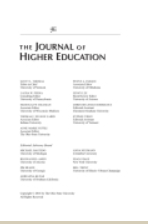
Abstract:
A conceptual framework grounded on procedural justice theory was created to explain how judgments about the fairness of tenure decision-making evolved among faculty who had not yet undergone the review. The framework posits that faculty beliefs about fairness are influenced directly by their workplace experiences and both directly and indirectly by their socio-demographic characteristics.
Structural equation modeling was used to assess the proposed effects with data from 2,247 pre-tenure assistant professors at 21 research universities. The results substantiate the importance of perceived campus and department conditions.
Equitable treatment of junior faculty at the department level and effectiveness of feedback have the strongest relationships with beliefs about the equity of tenure decision-making. An individual’s sense of control during the process of constructing the tenure dossier predicts his or her judgments about the fairness of tenure reviews. Practical suggestions for campus leaders and implications for future research are discussed.
An analysis of job satisfaction among Millennial faculty at southeastern colleges and universities
Citation:
Thesis Type:
DissertationAbstract:
Millennials will dominate the global workplace as the prominent generational cohort by 2020. This projection surfaces considerations for recruitment and succession planning within higher education.
This study investigated how Millennials’ workplace preferences impact faculty job satisfaction. The research inquiry was launched utilizing institutional data from four-year public and private institutions in the Southeast to assess the relationship between overall job satisfaction and mentoring satisfaction, and to compare Millennial faculty job satisfaction to senior generations. The study uses Faculty Job Satisfaction Survey data.
From the analysis of 9,496 faculty responses, the study produced statistically significant outcomes that addressed the research inquiry. The outcome of the investigation signals a strong correlation between the impacts of mentoring satisfaction and the overall job satisfaction of Millennial faculty. Pragmatic talent management and organizational development strategies are recommended to assist institutions in leveraging the power of the multi-generational workforce to attract and retain Millennial faculty.
Effects of generation on tenure-track faculty satisfaction
Citation:
Thesis Type:
DissertationAbstract:
The academy is generationally diversifying as Baby Boomer faculty members move into retirement and younger faculty enter the workforce. Understanding and addressing generational differences is increasingly important, as employees across a broad age range will be working together.
This quantitative study explored the effects of generation on tenure-track faculty job satisfaction. Aside from obtaining a generational snapshot of tenure-track faculty, this study sought to determine if generation could predict job satisfaction indices. Multiple regression analyses were conducted on variables obtained from a pre-existing aggregated Faculty Job Satisfaction Survey dataset. Statistically significant demographic effects emerged in seven job satisfaction indices, but multiple regression results provided little evidence to suggest demographic variables, which have frequently been used to explain differences between groups, are strong predictors of tenure-track faculty satisfaction. These findings raise questions about the credibility of claims by generational practitioners and consultants and signify that more research is needed.
Recognizing Faculty with Disabilities: Data and Considerations from the Faculty Job Satisfaction Survey
Citation:
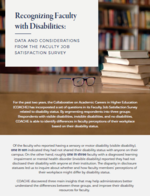
Abstract:
In 2019, COACHE added a series of questions about disability status to our flagship Faculty Job Satisfaction Survey. Two years of data were examined to understand how faculty's experience of the academic workplace might vary depending on their disability type and disclosure status. Review the infographic below to understand how attitudes and disclosure differ across types of disabilities and how administration can create inclusive policies to address these key insights. Click here for an accessible version of the document.Assessing the Needs of Part-Time Faculty: Lessons Learned from the University at Buffalo
Citation:
Abstract:
According to the American Association of University Professors (AAUP), approximately 40% of all faculty across all institutional types are now part-time. This subset of adjunct faculty is fulfilling a critical role in the higher education landscape, yet the variability of these appointments makes it exceedingly difficult to assess their needs and, ultimately, provide adequate support.
In 2017, COACHE partners at the University at Buffalo set out to address this knowledge gap by adapting the Faculty Job Satisfaction Survey to suit the needs of their part-time faculty. In this webinar, Robert Granfield and Tilman Baumstark will share the challenges faced and lessons learned, both from their methodology and from their faculty, throughout this endeavor.
Does the environment matter? Faculty satisfaction at 4-year colleges and universities in the USA
Citation:

Abstract:
Faculty members seek employment in an environment that offers good fit and work satisfaction. This study examined faculty satisfaction by institution type (baccalaureate, master’s, doctoral, and research) for recent full-time faculty members in 100 4-year institutions in the United States.
Analysis of the Faculty Job Satisfaction Survey showed that respondents in baccalaureate colleges reported the highest satisfaction. Subsequent analyses to examine strength of difference across institutional type confirmed initial differences for some facets of satisfaction, but not for others. Results showed that faculty perceptions of the institutional environment firmly contribute to their satisfaction. The authors discuss the implications of their findings for policies and programs.
Faculty Departure and Retention at Small Liberal Arts Colleges
Citation:
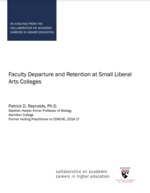
Abstract:
Voluntary faculty departures can often be prevented, but a lack of common exit procedures have hindered institutions’ ability to create proactive practices of faculty retention and instead harbor reactive tendencies with little positive outcome. Through interviews with 22 CAOs at liberal arts colleges, Patrick D. Reynolds, former Visiting Practitioner to COACHE, discovered partner employment and career choice were the two most prominent reasons for departures. Outliers also revealed that work and social environments, especially for faculty members of minority groups, often played a role in dissatisfaction.
Success After Tenure: Lessons in Engaging Midcareer Faculty
Citation:
Abstract:
Mid-career faculty actively seek professional satisfaction and personal well-being in their careers at the departmental and institutional level. However, a growing body of research tells us that the policies and practices in place at colleges and universities do not always support this goal. This webinar, “Success After Tenure: Lessons in Engaging Mid-Career Faculty,” offers an inside take on the themes of the book Success After Tenure: Supporting Mid-Career Faculty and provide real-world best practices from practitioners in the field.
Full Text
Watch the Recording
Download the presentation slides
Building a Better Exit Study: A National Effort to Understand Faculty Retention & Turnover
Citation:
Abstract:
In 2016, COACHE partnered with the University of California System to pilot our newest undertaking -- the Faculty Retenion and Exit Survey. This survey is the only multi-institutional study of faculty retention and exit, and examines the costs, conduct, and causes of faculty turnover.
In this webinar, Kiernan Mathews and Todd Benson describe how the survey came to be, and outline some of the initial findings from the pilot study along with some practical recommendations for Academic Affairs administrators.
Family policies and institutional satisfaction: An intersectional analysis of tenure-track faculty
Citation:
Thesis Type:
DissertationAbstract:
Guided by an intersectional perspective, this study compares responses to the 2008 and 2009 Tenure-Track Faculty Job Satisfaction survey provided by four groups of faculty: African American women, African American men as well as white women and white men. The study examines faculty perceptions regarding the importance of family policies as related to career success, the effectiveness of family policies at the institution, and the level of satisfaction with work-life balance. The findings indicate that there are significant differences in policy perceptions and work-life satisfaction. African American women overwhelmingly indicate that eldercare policy is important to career success, while white women are more concerned with childcare policy. Significant group differences emerge in faculty assessment of childcare policy. The analysis reveals institutional-level support for care work influences overall satisfaction with the institution more than departmental support. The findings suggest care work still matters in relation to a faculty member's career advancement.
Work life balance and job satisfaction among faculty at Iowa State University
Citation:
Thesis Type:
DissertationAbstract:
This study utilized the existing database from the Iowa State University 2009-2010 Faculty Job Satisfaction Survey to explore faculty work life balance and job satisfaction among academic disciplines. This research sought to determine if (a) work life differs by academic discipline group: (b) job satisfaction differs by academic discipline, and (c) there is a relationship between faculty work life and job satisfaction and whether this relationship differs by academic discipline group, and (d) if academic discipline has a unique effect on faculty work and life balance.
The results indicated that there is a significant relationship between work life and job satisfaction. When controlling for demographic and professional experience, the result also indicated that age and climate, and culture were significant predicators for work life balance. The results also showed that female faculty have lower job satisfaction, and indicated that the level of job satisfaction was lower for hard pure disciplines than soft pure disciplines.
Success on the Tenure Track: Five Keys to Faculty Job Satisfaction
Citation:
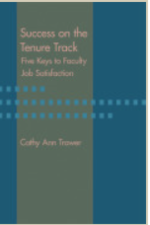
Abstract:
Landing a tenure-track position is no easy task. Achieving tenure is even more difficult. Under what policies and practices do faculty find greater clarity about tenure and experience higher levels of job satisfaction? What makes an institution a great place to work?
In 2005–2006, the Collaborative on Academic Careers in Higher Education surveyed more than 15,000 tenure-track faculty at 200 institutions. The survey was designed around five key themes: tenure clarity, work-life balance, support for research, collegiality, and leadership.
Success on the Tenure Track positions the survey data in the context of actual colleges and universities. Best practices at the highest-rated institutions in the survey—Auburn, Ohio State, North Carolina State, Illinois at Urbana-Champaign, Iowa, Kansas, and North Carolina at Pembroke—give administrators practical, proven advice on increasing employee satisfaction. Additional chapters discuss faculty demographics, trends in employment practices, creating a great workplace for faculty, and the future of tenure.
Gender and Race Differences in Faculty Assessment of Tenure Clarity: The Influence of Departmental Relationships and Practices
Citation:
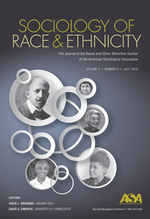
Abstract:
The authors look at how the intersection of gender and race influences pre-tenure faculty members’ perceptions of the clarity of tenure expectations. The authors also seek to identify potential predictors (assessment of mentoring, relationships with peers, feedback on progress toward tenure, and fairness in tenure decision making and evaluation) of perceptions of tenure clarity for four intersectionally defined groups, including historically underrepresented minority women (URMW). The authors use an intersectional perspective and the gendered and racialized organizations’ theoretical lens to interpret the results. The data set comes from the Faculty Job Satisfaction Survey. Findings show that compared with white men, URMW are less satisfied with their relationships with peers and with the fairness in the evaluation of their work. They are also less likely to agree that mentoring is effective, that tenure decisions are fair, and that messages about tenure are consistent.International Faculty Perceptions of Departmental Climate and Workplace Satisfaction
Citation:
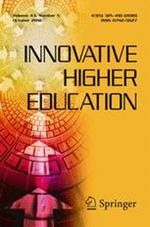
Abstract:
Although the variability in the definitions and immigration status of international academics makes it challenging to provide the exact number of foreign-born faculty members teaching and conducting research in U.S. postsecondary institutions, all data accounts have pointed to a steady growth in this segment of the professoriate. This study used data from the 2011-2014 Faculty Job Satisfaction Survey to examine international faculty members’ satisfaction with autonomy, interactions with colleagues, departmental climate, and recognition and the effect of these elements upon the overall workplace satisfaction of international faculty members relative to their U.S. citizen peers.
This study helps identify factors that can enhance international faculty members’ satisfaction in order to aid institutions in their efforts not only to recruit the best talent but also to support and retain such talent.
Climate Change: Creating Space for Interdepartmental Problem Solving at Skidmore College
Citation:
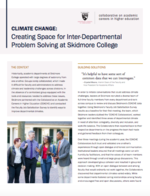
Abstract:
Historically, academic departments at Skidmore College operated with large degrees of autonomy from one another. Groups rarely collaborated, which made it difficult for faculty and administrators to address climate and leadership challenges across divisions. In the absence of a centralized group equipped with the tools and resources needed to address these issues, Skidmore partnered with the Collaborative on Academic Careers in Higher Education (COACHE) and conducted the Faculty Job Satisfaction Survey to identify ways to improve departmental climates.
Using Skidmore’s survey results as a baseline for their first meeting, the team, which Skidmore leaders dubbed the ‘COACHE Collaborators’, worked together to identify three areas of departmental climate in need of attention: collegiality, diversity and inclusion, and work-life balance.
Browse Resources by Faculty Type
The Art of Diversity: A Chronicle of Advancing the University of California Faculty through Efforts in Diversity, Equity, and Inclusion, 2010–2022
Citation:
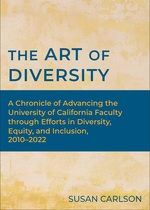
Abstract:
In The Art of Diversity: A Chronicle of Advancing the University of California Faculty through Efforts in Diversity, Equity, and Inclusion, 2010–2022, Susan Carlson details the University of California’s systemwide efforts to increase the diversity of its faculty during her tenure as Vice Provost, UC Office of the President. It tells the story of a remarkable alignment of California stakeholders—from the UC Regents and University leaders to the Academic Senate and the California legislature, from small faculty teams to multicampus coalitions—and how they worked to create a 21st-century faculty that reflects the diversity of California. This chronicle’s central focus is on a community of practice dedicated to excellence and equity. Efforts began with a program focused on finding new ways to collect data on faculty recruitment and create multicampus discussions on key topics like mentoring, intersectional racial and gender identities, workplace climate, and statements on diversity, equity, and inclusion. These efforts continued with a novel interactive theater program for department chairs and deans. The capstone effort, Advancing Faculty Diversity, provides opportunities to pilot new ways to recruit and sustain inclusive and equitable academic communities.
Carlson addresses this central academic issue: how to build a faculty that is different from the past not only in its gender and racial makeup, but also in its research methodologies, transdisciplinary partnerships, and multimodal pedagogies.
Clear as Mud: Promotion Clarity by Gender and BIPOC Status Across the Associate Professor Lifespan
Citation:
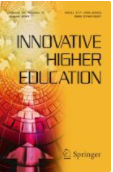
Abstract:
Mid-career faculty members often seek to advance to the highest faculty rank of full professor, but research suggests women and Black, Indigenous and Other People of Color (BIPOC) faculty face inequitable patterns in advancement to the full professor rank. This study focuses on associate professors’ perceptions of promotion clarity, or the degree to which they are clear about the processes and criteria for advancing to the full professor rank.Personal and Institutional Predictors of Work-Life Balance among Women and Men Faculty of Color
Citation:
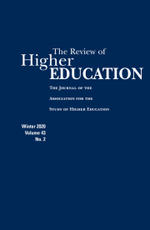
Abstract:
This study examines predictors of perceived work-life balance among women and men faculty of color using data from the Collaborative on Academic Careers in Higher Education (COACHE). Asian American men faculty report higher perceived work-life balance, while African American women faculty report lower perceived work-life balance as compared to other faculty members. Findings from multivariate analyses show that the strongest, most consistent positive predictor of perceived work-life balance was the faculty perception that the institution does what it can to make personal/family obligations and an academic career compatible. The findings offer important implications for institutional and departmental climate and policy.- 1 of 4
- »
Beyond Teaching and Research: Faculty Perceptions of Service Roles at Research Universities
Citation:
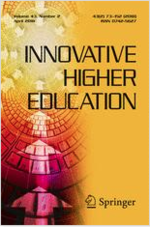
Abstract:
Faculty members in higher education institutions frequently have the responsibility of providing service activities to their institutions, professional societies, and external communities. This responsibility, however, generally carries little reward in the workplace and does not play a major role in promotion criteria. This study drew upon a sample of 4,400 research university faculty members surveyed through the Faculty Job Satisfaction Survey to explore their satisfaction with service roles by academic rank. Findings showed that mid-career faculty members at the associate professor rank were significantly less satisfied with their service functions, including workload, equity, work balance, recognition, and institutional support, when compared with both assistant and full professors.
Understanding the changing faculty workforce in higher education: A comparison of non-tenure track and tenure line experiences
Citation:

Abstract:
Non-tenure track faculty are a growing majority in American higher education, but research examining their work lives is limited. Moreover, the theoretical frameworks commonly used by scholars have been critiqued for reliance on ideologically charged assumptions. Using a conceptual model developed from Hackman and Oldham’s (1980) Job Characteristics Model (JCM) and prior research on faculty workplace experiences, this study considers the extent to which full-time non-tenure track and tenure line faculty share a professionalized approach to their jobs, working conditions, and how this is associated with their organizational commitment.
Satisfaction with resources, rewards, autonomy and feedback had a significant positive relationship with odds of organizational commitment for all faculty groups. Overall, the results suggest being removed from the tenure track is not associated with faculty viewing their jobs in a substantially different way than those in tenure line positions, which underscores the importance of conceptualizing full-time faculty work as an integrated whole.
Is the Tenure Process Fair? What Faculty Think
Citation:

Abstract:
A conceptual framework grounded on procedural justice theory was created to explain how judgments about the fairness of tenure decision-making evolved among faculty who had not yet undergone the review. The framework posits that faculty beliefs about fairness are influenced directly by their workplace experiences and both directly and indirectly by their socio-demographic characteristics.
Structural equation modeling was used to assess the proposed effects with data from 2,247 pre-tenure assistant professors at 21 research universities. The results substantiate the importance of perceived campus and department conditions.
Equitable treatment of junior faculty at the department level and effectiveness of feedback have the strongest relationships with beliefs about the equity of tenure decision-making. An individual’s sense of control during the process of constructing the tenure dossier predicts his or her judgments about the fairness of tenure reviews. Practical suggestions for campus leaders and implications for future research are discussed.
Gender Differences in Faculty Member Job Satisfaction: Equity Forestalled?
Citation:

Abstract:
Guided by Hagedorn’s (2000) theory of faculty job satisfaction, mindful of social and organizational structures of higher education, and acknowledging recent changes in the academic labor market, this study examines satisfaction for approximately 30,000 tenured and tenure-track faculty members in 100 US colleges and universities. Findings revealed similarity between female and male faculty members in some aspects of work satisfaction, but difference in other areas in which women reported lower satisfaction. Findings also revealed that perceptions of department fit, recognition, work role balance, and mentoring are more important to women faculty’s satisfaction than male peers. These findings have implications for policy and practice.
Beyond Teaching and Research: Faculty Perceptions of Service Roles at Research Universities
Citation:

Abstract:
Faculty members in higher education institutions frequently have the responsibility of providing service activities to their institutions, professional societies, and external communities. This responsibility, however, generally carries little reward in the workplace and does not play a major role in promotion criteria. This study drew upon a sample of 4,400 research university faculty members surveyed through the Faculty Job Satisfaction Survey to explore their satisfaction with service roles by academic rank. Findings showed that mid-career faculty members at the associate professor rank were significantly less satisfied with their service functions, including workload, equity, work balance, recognition, and institutional support, when compared with both assistant and full professors.
Understanding the changing faculty workforce in higher education: A comparison of non-tenure track and tenure line experiences
Citation:

Abstract:
Non-tenure track faculty are a growing majority in American higher education, but research examining their work lives is limited. Moreover, the theoretical frameworks commonly used by scholars have been critiqued for reliance on ideologically charged assumptions. Using a conceptual model developed from Hackman and Oldham’s (1980) Job Characteristics Model (JCM) and prior research on faculty workplace experiences, this study considers the extent to which full-time non-tenure track and tenure line faculty share a professionalized approach to their jobs, working conditions, and how this is associated with their organizational commitment.
Satisfaction with resources, rewards, autonomy and feedback had a significant positive relationship with odds of organizational commitment for all faculty groups. Overall, the results suggest being removed from the tenure track is not associated with faculty viewing their jobs in a substantially different way than those in tenure line positions, which underscores the importance of conceptualizing full-time faculty work as an integrated whole.
Personal and Institutional Predictors of Work-Life Balance among Women and Men Faculty of Color
Citation:

Abstract:
This study examines predictors of perceived work-life balance among women and men faculty of color using data from the Collaborative on Academic Careers in Higher Education (COACHE). Asian American men faculty report higher perceived work-life balance, while African American women faculty report lower perceived work-life balance as compared to other faculty members. Findings from multivariate analyses show that the strongest, most consistent positive predictor of perceived work-life balance was the faculty perception that the institution does what it can to make personal/family obligations and an academic career compatible. The findings offer important implications for institutional and departmental climate and policy.The possibility of promotion: How race and gender predict promotion clarity for associate professors
Citation:
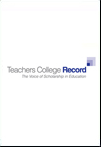
Abstract:
Past studies have strongly suggested that equity issues affect advancement through the academic pipeline. This study uses cross-institutional results from the 2010 through 2012 Faculty Job Satisfaction Surveys to offer analysis and potential solutions for the problem.
The study asks whether cultural taxation in the form of heavy service and advising—often associated with underrepresented minority faculty and women faculty—is a factor in advancement through the academic pipeline, and also examines the influence of ideal-worker norms and work/family demands on perceptions of promotion clarity. The analysis suggests that the factors associated with lack of clarity about promotion are more structural than individual.
Gender and Race Differences in Faculty Assessment of Tenure Clarity: The Influence of Departmental Relationships and Practices
Citation:

Abstract:
The authors look at how the intersection of gender and race influences pre-tenure faculty members’ perceptions of the clarity of tenure expectations. The authors also seek to identify potential predictors (assessment of mentoring, relationships with peers, feedback on progress toward tenure, and fairness in tenure decision making and evaluation) of perceptions of tenure clarity for four intersectionally defined groups, including historically underrepresented minority women (URMW). The authors use an intersectional perspective and the gendered and racialized organizations’ theoretical lens to interpret the results. The data set comes from the Faculty Job Satisfaction Survey. Findings show that compared with white men, URMW are less satisfied with their relationships with peers and with the fairness in the evaluation of their work. They are also less likely to agree that mentoring is effective, that tenure decisions are fair, and that messages about tenure are consistent.Browse Resources by Type
- Infographics
- Partner Case Studies
- Publications using COACHE data
- Statistical Reports
- Webinars
- Whitepapers
- Year in Review
2019 Year in Review: The Collaborative on Academic Careers in Higher Education
Citation:
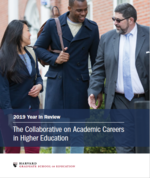
Abstract:
COACHE’s 2019 work focused on two types of faculty members: those who leave and those who lead. This work incorporated a larger number of faculty members than in 2018, with 41 colleges, universities, and specialized programs in the 2019 Faculty Job Satisfaction Survey cohort, a total of more than 28,000 faculty participants, and an average institutional response rate of 54 percent.
Institutional reports for the Faculty Retention and Exit Survey indicate why faculty leave—or remain—at their institutions, and where inequities arise in retention negotiations. COACHE’s work also examined how we define faculty leadership, and which faculty leaders—women and humanities faculty among them—are less likely to receive institutional support in sustaining other aspects of their work.
2018 Year in Review: The Collaborative on Academic Careers in Higher Education
Citation:
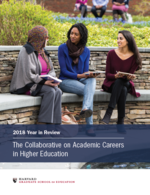
Abstract:
In 2018, the Collaborative on Academic Careers in Higher Education collaborated with the Harvard Institutes for Higher Education (HIHE) to launch the first ever Seminar on Leadership of the Faculty, a three-day workshop for academic leadership. An introduction between Harvard Club of New York, HIHE, and COACHE partners in the CUNY system led to a $100,000 grant for CUNY to invest in developing diverse faculty leadership. Data from the Faculty Job Satisfaction Survey yielded an exploration of mid-career faculty, an ongoing pursuit to prevent mid-career malaise and provide support. The Faculty Retention and Exit Survey revealed the risk that a “counteroffer culture” poses to faculties’ home institutions during salary negotiations. Finally, an overhaul of our data dissemination process has made it easier for researchers to access our data in order to implement institutional changes.
2017 Year in Review: The Collaborative on Academic Careers in Higher Education
Citation:
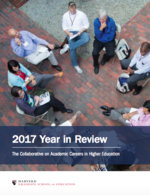
Abstract:
In the 2016-2017 academic year, the Collaborative welcomed our largest and most diverse cohort of Faculty Job Satisfaction partners to date with over 60 higher education institutions—public and private, two- and four-year—joining our ranks. After a successful pilot, we launched the first ever multi-institutional study of Faculty Retention and Exit to 12 institutions nationwide in the spring and 22 in the fall. And to complement our survey offerings, we adapted our reporting platform to be more robust than ever, with additional race and ethnicity categories and academic area analyses.
Recognizing Faculty with Disabilities: Data and Considerations from the Faculty Job Satisfaction Survey
Citation:

Abstract:
In 2019, COACHE added a series of questions about disability status to our flagship Faculty Job Satisfaction Survey. Two years of data were examined to understand how faculty's experience of the academic workplace might vary depending on their disability type and disclosure status. Review the infographic below to understand how attitudes and disclosure differ across types of disabilities and how administration can create inclusive policies to address these key insights. Click here for an accessible version of the document.Revealing Data on Faculty Retention & Departure
Citation:
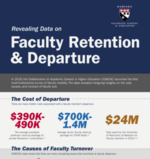
Abstract:
In 2017, after a successful pilot with several campuses of a large public university system, COACHE launched the Faculty Retention and Exit Survey nationwide. This study represents the first multi-institutional survey of faculty retentions (among those with outside offers) and departures. Until now, there was no coordinated effort for universities to develop a common understanding of the causes, costs, and conduct of faculty mobility.
Among the takeaways: More than half of faculty ranked salary as a secondary factor or not a factor in their decision to stay or leave. But 67% selected quality of colleagues as a compelling factor. The study also found that faculty are expected to cultivate outside offers before they can ask for a better deal at home, and that this requirement pushes them out the door: nearly 1 in 3 faculty who left originally sought the offer only to renegotiate the terms of their employment.
Full Text

Using the Faculty Job Satisfaction Survey to Improve Equity for Texas Tech Faculty
Citation:
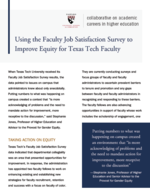
Abstract:
Upon receiving their Faculty Job Satisfaction Survey results, Texas Tech University set to work addressing some of the equity gaps brought to light. Among their priorities was departmental collegiality, diversity and equity across divisions, and department chair training. By creating two faculty fellow positions and a team Faculty Equity Advocates, Texas Tech is set to make meaningful changes on their campus.Tailoring a Survey for Campus Change at the University of Denver
Citation:
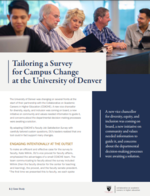
Abstract:
The University of Denver was changing on several fronts at the start of their partnership with the Collaborative on Academic Careers in Higher Education (COACHE). A new vice chancellor for diversity, equity, and inclusion was coming on board, a new initiative on community and values needed information to guide it, and concerns about the departmental decision-making processes were awaiting a solution.
By adapting COACHE’s Faculty Job Satisfaction Survey with carefully tailored custom questions, DU’s leaders realized that one tool could in fact support many changes.
Building Trust, Engaging Faculty, Taking Action: Supporting the Next Generation of Faculty at Georgia State University
Citation:
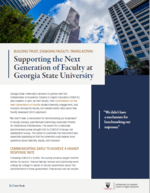
Abstract:
Georgia State University decided to partner with COACHE after the university’s Commission on the Next Generation of Faculty urged the institution to gather more robust data on diversity, equity, and inclusion on campus. The provost’s office made three guarantees to faculty about the Faculty Job Satisfaction Survey: the administration wanted to hear from every full-time faculty member, they would not receive data that would allow them to identify any individual faculty member, and they would use the results for campus improvement. This transparancy has already borne fruit. With a higher response rate than peer institutions and a renewed sense of trust, GSU administrators are moving forward in unpacking the results collaboratively with their faculty.- 1 of 2
- »
Clear as Mud: Promotion Clarity by Gender and BIPOC Status Across the Associate Professor Lifespan
Citation:

Abstract:
Mid-career faculty members often seek to advance to the highest faculty rank of full professor, but research suggests women and Black, Indigenous and Other People of Color (BIPOC) faculty face inequitable patterns in advancement to the full professor rank. This study focuses on associate professors’ perceptions of promotion clarity, or the degree to which they are clear about the processes and criteria for advancing to the full professor rank.Women Faculty in STEM Disciplines: Experiences with the Tenure Process and Departmental Practices
Citation:
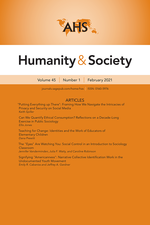
Abstract:
Using Faculty Job Satisfaction Survey data, the purpose of the study is to explore predictors of perceptions of tenure clarity for faculty in STEM and non-STEM fields. We use the gendered organization framework to examine whether for four groups of faculty (women and men in STEM and women and men in non-STEM), assessment of fairness in tenure decisions and evaluations, messages about tenure requirements, mentoring, and relationships with peers have a similar effect on their assessment of tenure clarity. Women in STEM fields are less likely to perceive the expectations for tenure as clear or to assess tenure decisions and evaluations as fair, mentoring as effective, and relationships with peers as satisfactory.Faculty Perceptions of Work-Life Balance: The Role of Marital/Relationship and Family Status
Citation:
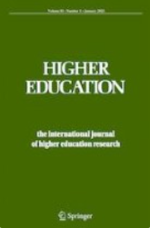
Abstract:
This study examined correlates of work-life balance perceptions for faculty from various marital/relationship and family statuses using data from the Collaborative on Academic Careers in Higher Education Faculty Job Satisfaction Survey. We found lower work-life balance among single (rather than married/partnered) faculty. These findings call for colleges and universities to directly address the work-life struggles of single faculty members with and without children. Our findings also underscore the importance of institutional support for making personal/family obligations and an academic career compatible for all faculty.Highlights Report 2008: Selected Results from the COACHE Tenure-Track Faculty Job Satisfaction Survey
Citation:
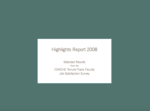
Abstract:
The Collaborative on Academic Careers in Higher Education provides academic leaders with peer data to monitor and improve work satisfaction among full-time, tenure-track faculty. More than 130 four-year colleges and universities have joined COACHE to enhance the quality of life for pre-tenure faculty and to enhance their ability to recruit, retain, and develop those faculty. The core element of COACHE is the Tenure-Track Faculty Job Satisfaction Survey. We now have job satisfaction data on over 8,000 pre-tenure faculty.
The COACHE Survey assesses faculty experiences in several areas: clarity and reasonableness of tenure processes and review; workload and support for teaching and research; importance and effectiveness of policies and practices; and climate, culture and collegiality on campus.
This COACHE Highlights Report complements the Institutional Report with an overview of results across all COACHE sites in the 2005-06, 2006-07, and 2007-08 cohorts. This year’s Report provides results disaggregated by race/ethnicity; by university control; and by gender.
COACHE Benchmark Exemplars, 2005-07
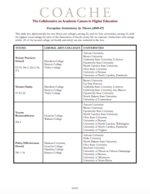
Abstract:
While the majority of junior faculty at America’s colleges and universities are satisfied at work, some institutions are doing particularly well in this regard. The Tenure-Track Faculty Job Satisfaction Survey, administered by the Collaborative on Academic Careers in Higher Education (COACHE) in 2005 and 2006, determined that some colleges and universities are “exemplary” on certain key dimensions of faculty work/life. The COACHE Survey considered the following categories in its assessment: tenure practices, clarity, and reasonableness; effectiveness of key policies (e.g., mentoring, childcare, and leaves); nature of work: teaching, research and support services; work and family balance; satisfaction with compensation; climate, culture, and collegiality; and global satisfaction.
“We are again recognizing those colleges and universities that are succeeding in their efforts to improve the quality of work/life for their junior faculty,” said Dr. Cathy Trower, COACHE Director. “By earning and maintaining the distinction of being a great place for new scholars to work, these exemplary institutions will be most able to attract and retain top academic talent in an increasingly competitive faculty labor market.”
- «
- 3 of 3
Examining the Impacts of COVID-19 on Faculty Retention & Exit
Citation:
Abstract:
For the last five years, the Collaborative on Academic Careers in Higher Education (COACHE) has been conducting the Faculty Retention and Exit Survey to gain a deeper understanding of the academic work environment by examining faculty mobility. In spring 2020, we added three COVID-19-related questions to the survey to capture the early effects of the pandemic.
In this webinar, Doctoral Fellow, Mai H. Vang, presents findings from the responses to those questions, which captured nine themes, including disruption of research, disconnection due to remote work, and inequities in the pandemic’s impact on particular faculty.
Download the full report of our findings and presentation slides
Full Text
Assessing the Needs of Part-Time Faculty: Lessons Learned from the University at Buffalo
Citation:
Abstract:
According to the American Association of University Professors (AAUP), approximately 40% of all faculty across all institutional types are now part-time. This subset of adjunct faculty is fulfilling a critical role in the higher education landscape, yet the variability of these appointments makes it exceedingly difficult to assess their needs and, ultimately, provide adequate support.
In 2017, COACHE partners at the University at Buffalo set out to address this knowledge gap by adapting the Faculty Job Satisfaction Survey to suit the needs of their part-time faculty. In this webinar, Robert Granfield and Tilman Baumstark will share the challenges faced and lessons learned, both from their methodology and from their faculty, throughout this endeavor.
Success After Tenure: Lessons in Engaging Midcareer Faculty
Citation:
Abstract:
Mid-career faculty actively seek professional satisfaction and personal well-being in their careers at the departmental and institutional level. However, a growing body of research tells us that the policies and practices in place at colleges and universities do not always support this goal. This webinar, “Success After Tenure: Lessons in Engaging Mid-Career Faculty,” offers an inside take on the themes of the book Success After Tenure: Supporting Mid-Career Faculty and provide real-world best practices from practitioners in the field.
Full Text
Watch the Recording
Download the presentation slides
- 1 of 2
- »
Benchmark Best Practices: Nature of Work: Teaching
Citation:
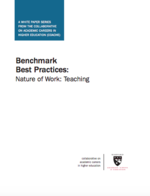
Abstract:
The COACHE surveys of college faculty produce data that are both salient to full-time college faculty and actionable by academic leaders. The survey items are aggregated into 20 benchmarks representing faculty satisfaction along key themes. This white paper examines teaching, based on survey responses that measure satisfaction or dissatisfaction with the portion of faculty members’ time spent on teaching, the number and level of courses taught, the number and quality of students taught, discretion over course content, and the distribution of teaching workload across department faculty.
The challenge for every faculty member is to strike a balance between institutional expectations for teaching and the time available to invest in it. Dissatisfaction can occur when faculty members feel expectations for teaching are unreasonable, institutional support is lacking, or the distribution of work is inequitable. Satisfaction can be raised through workshops about improving teaching, mentoring students, using instructional technologies, and experimenting with new techniques.
Benchmark Best Practices: Nature of Work: Service
Citation:
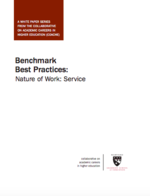
Abstract:
The COACHE surveys of college faculty produce data that are both salient to full-time college faculty and actionable by academic leaders. The survey items are aggregated into 20 benchmarks representing faculty satisfaction along key themes. This white paper examines service: faculty satisfaction or dissatisfaction with the portion of their time spent on service, the number of committees on which they serve, the attractiveness of those committees, and the discretion faculty have to choose them.
The COACHE survey instrument asks questions about the quantity, quality, and equitable distribution of their service work, as well as their institutions’ efforts to help faculty be service leaders and sustain their other commitments. In follow-up interviews with faculty and institutional leaders, a common refrain emerged: faculty are eager to participate not in more service, but in more meaningful service, and institutions must do better to engage and to reward those contributions.
Benchmark Best Practices: Nature of Work: Research
Citation:
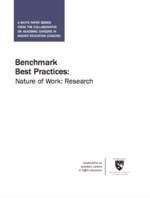
Abstract:
The COACHE surveys of college faculty produce data that are both salient to full-time college faculty and actionable by academic leaders. The survey items are aggregated into 20 benchmarks representing faculty satisfaction. This white paper discusses research, including the portion of faculty time spent on research, external funding, the influence faculty have over the focus of their research/scholarly/creative work, the availability of course release time, and institutional support. Faculty satisfaction with research is a function not just of the time faculty members have to commit to research, but of the clarity and consistency of institutional expectations for research productivity and the resources colleges and universities provide faculty to meet them.
COACHE researchers interviewed leaders from member institutions whose faculty rated items in this theme exceptionally well. While several of the highest ratings were found at baccalaureate institutions, the lessons derived from our interviews with their leaders are transferrable to universities at the school-, college-, or division-level.

